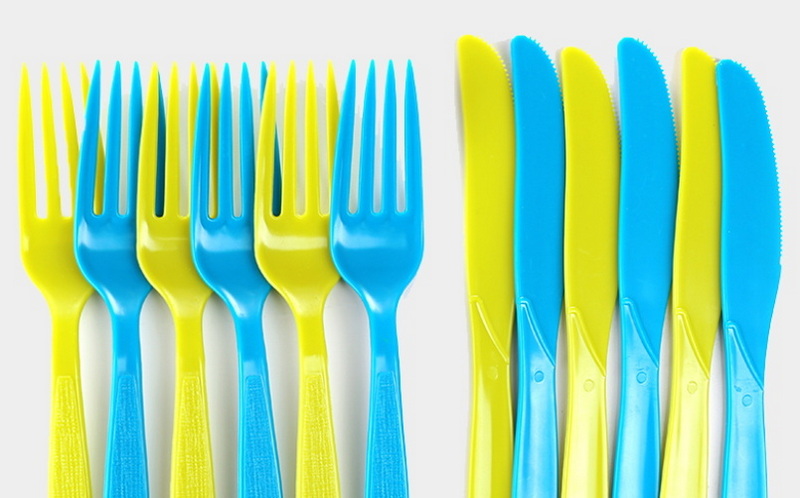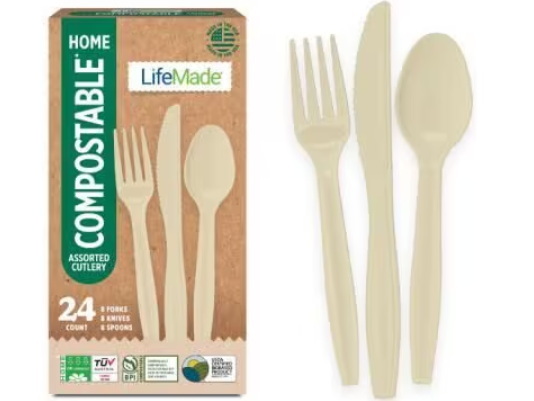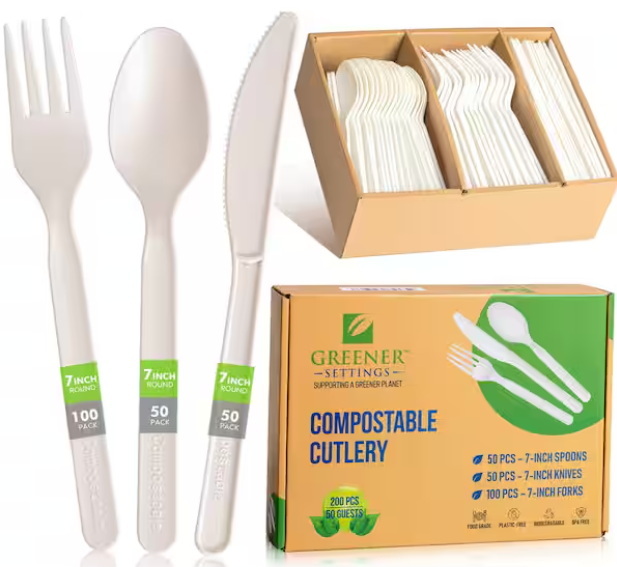
Content Menu
● Introduction to Disposable Utensils
>> Traditional Plastic Utensils
>> Sustainable Alternatives
● Recycling Disposable Utensils
>> Challenges in Recycling Plastic Utensils
>> Recycling Wooden Utensils
● Composting Disposable Utensils
>> Benefits of Composting
>> Challenges in Composting
● Sustainable Materials for Disposable Utensils
>> Corn Resin Utensils
>> Bamboo Utensils
>> Bioplastics
● Implementing Sustainable Practices
>> Consumer Awareness
>> Policy and Regulation
● Future Developments
>> Emerging Technologies
>> Circular Economy
● Conclusion
● FAQ
>> 1. Can Plastic Utensils Be Recycled?
>> 2. How Do I Compost Wooden Utensils?
>> 3. What Are the Benefits of Composting Disposable Utensils?
>> 4. Can All Compostable Utensils Be Composted at Home?
>> 5. How Do I Choose Sustainable Disposable Utensils?
In recent years, the environmental impact of disposable utensils has become a pressing concern. As consumers increasingly seek sustainable alternatives to traditional plastic cutlery, disposable spoon and fork sets made from materials like wood, bamboo, and bioplastics have gained popularity. This article explores whether these sets can be recycled or composted, highlighting the benefits and challenges associated with each method.

Introduction to Disposable Utensils
Disposable utensils, including disposable spoon and fork sets, are designed for convenience but often contribute to significant environmental issues. Traditional plastic utensils are non-biodegradable and contribute to plastic pollution, while newer alternatives aim to reduce waste through compostability or recyclability.
Traditional Plastic Utensils
Traditional plastic utensils are made from fossil fuels and do not biodegrade. Instead, they break down into microplastics, which contaminate ecosystems and harm wildlife. The production of plastic utensils also contributes to greenhouse gas emissions, making them a significant environmental concern.
Plastic pollution has become a global issue, with plastic waste found in oceans, rivers, and even in the food chain. Reducing the use of plastic utensils is crucial for mitigating this problem.
Sustainable Alternatives
Sustainable alternatives to plastic utensils include disposable spoon and fork sets made from wood, bamboo, or bioplastics. These materials are often compostable, providing a more environmentally friendly option.
Bamboo, for instance, is a highly renewable resource that grows quickly and requires minimal water and pesticides. Bamboo utensils are lightweight, durable, and compostable, making them an attractive choice for those seeking eco-friendly options.
Recycling Disposable Utensils
Recycling is a crucial step in reducing waste, but not all disposable utensils can be recycled. Plastic utensils, for instance, are rarely recyclable due to their shape and material composition.
Challenges in Recycling Plastic Utensils
Plastic utensils are not typically recyclable because they can contaminate recycling streams. Their small size and irregular shape make them difficult to sort and process in recycling facilities. Additionally, many plastic utensils are made from mixed materials, which complicates the recycling process.
Recycling Wooden Utensils
Wooden utensils, including disposable spoon and fork sets, can be composted rather than recycled. Composting untreated wood returns nutrients to the soil and reduces waste. However, not all wooden utensils are suitable for composting; they must be free of chemicals and contaminants.
Composting Disposable Utensils
Composting is a viable option for disposable spoon and fork sets made from organic materials like wood or bamboo. This process involves breaking down the utensils into nutrient-rich soil amendments.
Benefits of Composting
Composting disposable spoon and fork sets offers several benefits:
- Nutrient Recycling: Composting returns nutrients to the soil, improving soil health and fertility.
- Carbon Sequestration: Composting reduces carbon emissions by storing carbon in the soil rather than releasing it as CO2.
- Waste Reduction: Composting reduces the amount of waste sent to landfills, where it would otherwise decompose slowly and release methane.
Challenges in Composting
While composting is beneficial, it requires specific conditions to be effective. Not all materials can be composted, and improper composting can lead to contamination. For example, compost piles need a balance of "green" materials (like food scraps) and "brown" materials (like leaves or straw) to decompose efficiently.
Sustainable Materials for Disposable Utensils
Sustainable materials like corn resin, birch wood, and bamboo are increasingly used for disposable spoon and fork sets. These materials are often compostable, reducing environmental impact.
Corn Resin Utensils
Corn resin utensils are made from plant-based materials and are compostable. They offer a biodegradable alternative to traditional plastics. However, the production process for corn resin can be energy-intensive, and the use of genetically modified corn is a concern for some consumers.
Bamboo Utensils
Bamboo utensils are lightweight, durable, and compostable. Bamboo is a highly renewable resource, making it an attractive option for sustainable utensils. Bamboo requires minimal water and pesticides, reducing its environmental footprint compared to traditional wood products.
Bioplastics
Bioplastics are another sustainable option for disposable spoon and fork sets. Made from renewable biomass sources like corn starch or sugarcane, bioplastics are biodegradable and can be composted under the right conditions. However, not all bioplastics are created equal; some may require industrial composting facilities to break down properly.

Implementing Sustainable Practices
Implementing sustainable practices in daily life can significantly reduce environmental impact. Choosing disposable spoon and fork sets made from compostable materials is a step towards reducing plastic waste and promoting a circular economy.
Consumer Awareness
Consumer awareness plays a crucial role in driving demand for sustainable products. By choosing eco-friendly options and supporting companies that prioritize sustainability, consumers can influence market trends and encourage more environmentally responsible practices.
Policy and Regulation
Policy and regulation are also essential for promoting sustainability. Governments can implement policies that encourage the use of compostable materials and provide incentives for companies to adopt sustainable practices.
Future Developments
As technology advances, new materials and methods for producing sustainable disposable spoon and fork sets are being developed. Innovations in bioplastics and plant-based materials are expected to further reduce the environmental impact of disposable utensils.
Emerging Technologies
Emerging technologies, such as microbial fermentation, are being explored to create new biodegradable materials. These advancements could lead to more efficient composting processes and reduce the reliance on fossil fuels in utensil production.
Circular Economy
The concept of a circular economy emphasizes the reuse and recycling of materials to minimize waste. In the context of disposable spoon and fork sets, a circular economy would involve designing products that are fully compostable or recyclable, reducing waste and promoting sustainability.
Conclusion
In conclusion, while disposable spoon and fork sets cannot always be recycled, many are compostable, offering a more sustainable alternative to traditional plastics. Composting these utensils returns nutrients to the soil and reduces waste, contributing to a more environmentally conscious lifestyle.

FAQ
1. Can Plastic Utensils Be Recycled?
Plastic utensils are generally not recyclable due to their shape and material composition. They often contaminate recycling streams and end up in landfills.
2. How Do I Compost Wooden Utensils?
To compost wooden utensils, ensure they are untreated and free of contaminants. Place them in a compost pile with other organic materials, maintaining a balance of "green" and "brown" materials.
3. What Are the Benefits of Composting Disposable Utensils?
Composting disposable spoon and fork sets returns nutrients to the soil, reduces waste, and sequesters carbon, making it a more environmentally friendly disposal method.
4. Can All Compostable Utensils Be Composted at Home?
Not all compostable utensils can be composted at home. Some require commercial composting facilities to break down properly. Always check the manufacturer's instructions.
5. How Do I Choose Sustainable Disposable Utensils?
Choose disposable spoon and fork sets made from sustainable materials like bamboo, birch wood, or corn resin. Ensure they are certified compostable to minimize environmental impact.

















